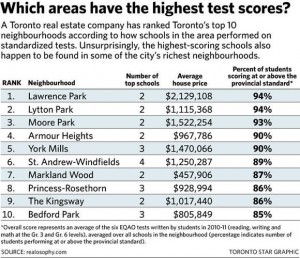 As Toronto REALTORS, we work with a lot of young families buying their first home. One of their top concerns, unsurprisingly, is proximity to “good schools”. Armed with EQAO scores (the standardized tests given by the province), they slash neighbourhood after neighbourhood from their list. But what is a “good school” anyway? And what do EQAO scores really mean?
As Toronto REALTORS, we work with a lot of young families buying their first home. One of their top concerns, unsurprisingly, is proximity to “good schools”. Armed with EQAO scores (the standardized tests given by the province), they slash neighbourhood after neighbourhood from their list. But what is a “good school” anyway? And what do EQAO scores really mean?
The Toronto Star wrote a story about a Toronto real estate brokerage that compared neighbourhoods and EQAO test scores: Want to Buy into a Top School? As non-parents, we were intrigued. And we wanted the rest of the story. Do EQAO school scores matter when buying a home? A TDSB teacher responds.
Related: Interactive Toronto Schools Map
Guest Blog – Cheryl – Grade 7 & 8 Special Needs Teacher – TDSB
…but education experts warn against placing too much emphasis on EQAO scores when determining which schools — and neighbourhoods — are “best.” – The Toronto Star
As an inner-city public school teacher in Toronto, I often find myself defending, what I believe to be, one of North America’s most diverse, global and productive public education systems. We truly have a dynamic framework, that is not perfect, but is effective. That being said, when examining standardized test scores such as EQAO, you will find “high” scores, “low” scores and everything in between. So, it is important that 1) we understand why the province needs these scores and 2) what they mean.
The province can use EQAO scores to get an idea of the AVERAGE level of students. That is to say, we can notice general trends in students’ understanding and performance when being tested on a broad range of topics. We can compare our test scores to other provinces and regions and in some ways, it can let us know if there is a problem when we see notable changes from year to year.
Now, let’s discuss STATS 101 for a minute. The scores from year to year are comparing different groups of students. That is, this year’s class of grade 6 students test scores may go up or down when compared to last years’ group of grade 6 students, but they are a DIFFERENT group of children. Therefore comparing classes from one year to the next, or schools with different and diverse populations doesn’t really make sense.
This data is collected using a STANDARDIZED test that is administered with MINIMAL or NO accommodations or modifications for differently-abled students such as Special Needs children or English Language learners. Therefore, if a school has speciality programs, those students’ scores are INCLUDED in the results. Also, if a student is eligible for an exemption from the test because professional educators believe the (week-long) test would be too overwhelming or stressful for the special needs student, they, in fact, receive a zero. Exemption?!! Doesn’t sound like an exemption to me. For example, at our school, we have 5 special needs classrooms with around 10 students per class who have designations of Mild Intellectual Delay or Developmental Disability. When these students are in grades 3 and 6 they either write the test that is not at their academic level, but grade level, and most likely will score much lower than the provincial standard, or these students are given exemptions, subsequently receiving a zero. These scores are recorded and included in our school scores. Also, English Language learners are not given translations in their first language. These scores are also included.
Our diverse student population creates a caring, empathetic environment. I would be proud to have my own child attend this school. Our staff is full of dedicated, talented and knowledgable professionals, and I take personal offence in knowing that at some point, someone looked at our test scores and said, “hmmm, maybe I’ll not send my child here, EQAO looks low”. The test results are collected and averaged into one uni-lateral score that only reports results in one aspect of a multi-lateral system.
I implore you to make informed decisions regarding your child’s education, please don’t be fooled into believing you have to live in Lawrence Park to receive the education you deserve. The TDSB, although not perfect, is a fantastic network of brilliant minds, just itching to teach your child something new and exciting.
Lastly, if you are in the home-buying game like I am, and really want to learn more about your child’s potential school (s): Go to the school. Talk to a teacher or two. Talk to the office administrator. Read the bulletin boards. Meet the parent council! Inquire about extracurricular opportunities. I bet you will be pleasantly surprised.
